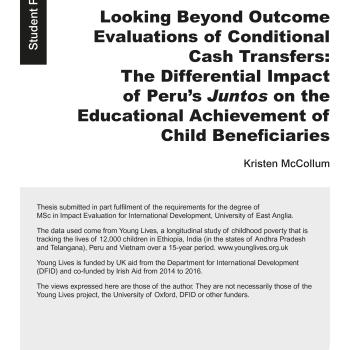
Despite the popularity of conditional cash transfers (CCTs) across Latin America, and proponents’ insistence that the programmes alleviate poverty in the long term, there is a lack of evidence on the impact of such programmes on students’ educational achievement. This paper represents one of just a handful of studies on the impact of CCTs on educational achievement, and to the author’s knowledge, it is the first evaluation of its kind for Peru’s Juntos.
Using quasi-experimental methods, this study analyses the differential impacts Juntos has by maternal education. Results show that Juntos has a negative impact on students whose mothers completed primary school.
These results contribute to the wider debate on ability tracking in education and the long-term effectiveness of CCTs across Latin America.

Despite the popularity of conditional cash transfers (CCTs) across Latin America, and proponents’ insistence that the programmes alleviate poverty in the long term, there is a lack of evidence on the impact of such programmes on students’ educational achievement. This paper represents one of just a handful of studies on the impact of CCTs on educational achievement, and to the author’s knowledge, it is the first evaluation of its kind for Peru’s Juntos.
Using quasi-experimental methods, this study analyses the differential impacts Juntos has by maternal education. Results show that Juntos has a negative impact on students whose mothers completed primary school.
These results contribute to the wider debate on ability tracking in education and the long-term effectiveness of CCTs across Latin America.

